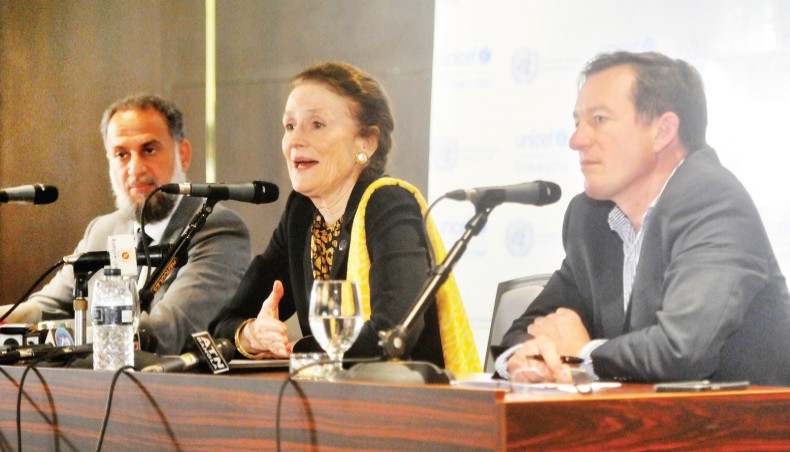UNICEF for birth registration, edn, skills of Rohingya kids
UNICEF executive director Henrietta Fore on Wednesday stressed the need for registration of Rohingya children born in Bangladesh after their mothers were forced to leave Rakhine amid atrocities committed by Myanmar military.
‘Birth identity, which allows a baby to have name, date of birth and nationality is important,’ Fore said replying to a question at a press briefing in Dhaka.
Rohingya children living in camps in Cox’s Bazar and the children in the local host communities also require education and skills training to constructing decent lives for themselves, she said.
‘The obligation we have as a global society is immense: to give children and young people the world has defined as ‘stateless’, the education and skills they need to build decent lives for themselves,’ Fore said during her two-day visit to Cox’s Bazar on February 25-26 with the United Nations secretary general’s humanitarian envoy Ahmed Al Meraikhi.
In Myanmar, the majority of Rohingya people have no legal identity or citizenship. In Bangladesh, children are not being registered at birth, they lack a legal identity, and they lack a refugee status, UNICEF observed.
A generation of Rohingya children and young people cannot be left without education and skills required to build a life for themselves, Fore said.
Stressing the need for introducing new sets of curriculum incorporating mathematics, science, languages, she said if they became self-sustaining, their communities would also become self-sustaining and would flourish.
On the point of identity of Rohingya children, Ahmed Al Meraikhi said without a legal identity, they are at the mercy of traffickers and drug dealers.
The international community, he said, ‘must agree now, and collectively invest in this generation of Rohingya children, so that they can better navigate their lives today, and be a constructive part of rebuilding Myanmar’s social fabric when they are able to return.’
A survey completed in December 2018 on 180,000 Rohingya children aged between 4-14 now enrolled in ‘Learning Centers’ across the Cox’s Bazar area, show the extent of the need for education, UNICEF said.
UNICEF representative in Dhaka Edouard Beigbeder also spoke at the press briefing.
More than 90 per cent were shown to have learning competencies at the pre-primary to grades 1-2 level, with just four per cent were at grade levels 3-5, and three per cent at 6-8.
By the end of 2018, just three per cent of Rohingya between the age of 15 and 24 were getting any education or vocational skills.
UNICEF said there is no viable solution in sight for these Rohingya children, who live in the world’s largest and most congested refugee settlement.
Half a million Rohingya children are stateless refugees in the Cox’s Bazar area in southern Bangladesh, increasingly anxious about their futures, and vulnerable to frustration and despair, it said.
This excludes these children from learning a formal education curriculum and they are desperately in need of marketable skills, it said.
UNICEF is now reaching 155,000 children aged between 4-14 with a learning programme that is progressively including higher quality and more structured learning and skills.
The priority for 2019 is to reach older adolescents with foundational skills in literacy and numeracy, and relevant vocational skills.
News Courtesy: www.newagebd.net











